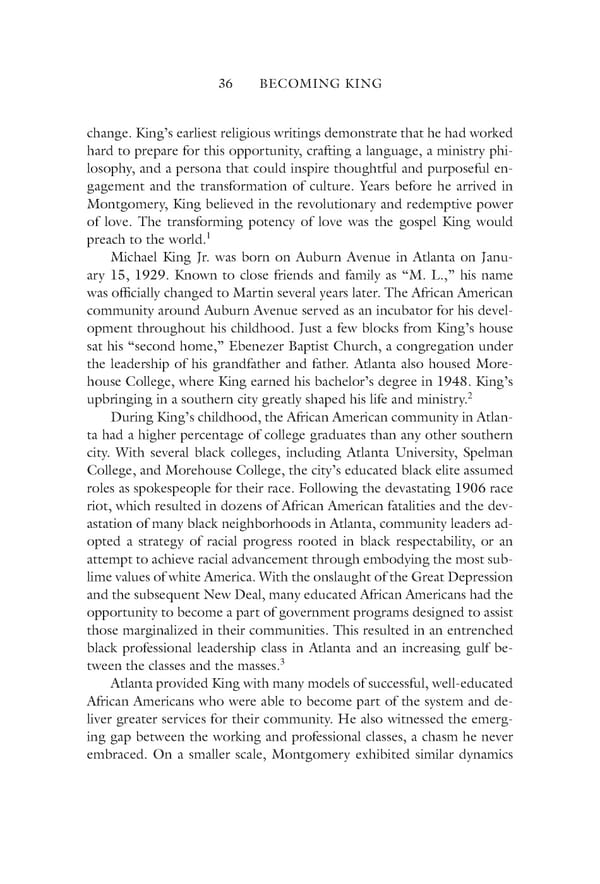36 BECOMING KING change. King’s earliest religious writings demonstrate that he had worked hard to prepare for this opportunity, crafting a language, a ministry phi- losophy, and a persona that could inspire thoughtful and purposeful en- gagement and the transformation of culture. Years before he arrived in Montgomery, King believed in the revolutionary and redemptive power of love. The transforming potency of love was the gospel King would 1 preach to the world. Michael King Jr. was born on Auburn Avenue in Atlanta on Janu- ary 15, 1929. Known to close friends and family as “M. L.,” his name was officially changed to Martin several years later. The African American community around Auburn Avenue served as an incubator for his devel- opment throughout his childhood. Just a few blocks from King’s house sat his “second home,” Ebenezer Baptist Church, a congregation under the leadership of his grandfather and father. Atlanta also housed More- house College, where King earned his bachelor’s degree in 1948. King’s 2 upbringing in a southern city greatly shaped his life and ministry. During King’s childhood, the African American community in Atlan- ta had a higher percentage of college graduates than any other southern city. With several black colleges, including Atlanta University, Spelman College, and Morehouse College, the city’s educated black elite assumed roles as spokespeople for their race. Following the devastating 1906 race riot, which resulted in dozens of African American fatalities and the dev- astation of many black neighborhoods in Atlanta, community leaders ad- opted a strategy of racial progress rooted in black respectability, or an attempt to achieve racial advancement through embodying the most sub- lime values of white America. With the onslaught of the Great Depression and the subsequent New Deal, many educated African Americans had the opportunity to become a part of government programs designed to assist those marginalized in their communities. This resulted in an entrenched black professional leadership class in Atlanta and an increasing gulf be- 3 tween the classes and the masses. Atlanta provided King with many models of successful, well-educated African Americans who were able to become part of the system and de- liver greater services for their community. He also witnessed the emerg- ing gap between the working and professional classes, a chasm he never embraced. On a smaller scale, Montgomery exhibited similar dynamics
 Becoming King: Martin Luther King Jr. Page 56 Page 58
Becoming King: Martin Luther King Jr. Page 56 Page 58